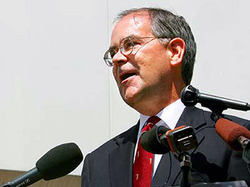Blue Dog points to electric co-ops in opposing public option -- but slammed electric co-ops last year
 Rep. Jim Cooper (D-TN) used to support a public option for a health care. But now he's become an advocate of the alternative put forward by health interests and his fellow Blue Dogs: non-profit health care cooperatives.
Rep. Jim Cooper (D-TN) used to support a public option for a health care. But now he's become an advocate of the alternative put forward by health interests and his fellow Blue Dogs: non-profit health care cooperatives.And to make the case, Rep. Cooper says we should look to the model of our country's rural electric co-operatives. As he told MSNBC yesterday:
"A co-op is really used over three-quarters of the land area of Americaso we buy our electricity that way," said Cooper. "It's a creature ofthe New Deal. It's worked really pretty well over all the country for70 or 80 years. It's owned by the customers; it is not owned by thegovernment. It works. It works real well."But Rep. Cooper hasn't always been so enthusiastic about the rural electric co-op model. In fact, just last year, Cooper published an article in the Harvard Journal on Legislation [pdf] that blasted the rural electric co-ops, which he argued had "turned away from their historic role" as pro-consumer organizations and had "taken on deeply troubling anti-consumer behaviors."
Entitled "Electric Co-Operatives: New Deal to Bad Deal?", Rep. Cooper's piece chronicles a list of failings of the electric co-op system. Among the biggest problems he finds:
* Many co-ops have turned away from their public interest mission, "acting distressingly similar to for-profit businesses," in some cases becoming "wealthy power companies." (p. 354).
* One result of the for-profit mentality is that the co-ops, Cooper argues, have cheated consumers out of money: "$3 billion to $9 billion" in capital credits that should be refunded to consumers (p. 375). Tennessee Valley Authority co-ops "have refused to refund any member equity" (p. 340).
* The electric co-ops have also "tried to hide information from their members ... Free of member scrutiny, co-op managers have often failed to serve their members' interests." (p. 339)
* Many co-ops are poorly run: "Co-op board members sometimes display astonishing ignorance of co-op business," argues Cooper, "but are insulated from liability for their decisions due to the co-op's not-for-profit status" (p. 362).
* Co-ops lack regulatory oversight: "Sarbanes-Oxley requirements for independent directors or audit committee experience do not apply," Cooper warns. (p. 362). Lax oversight has led to dozens of scandals: For example, "A suburban Fort Worth co-op borrowed a billion
dollars to buy a golf course, Westin hotel, and shopping mall--then declared bankruptcy" (p. 341).
* Electric co-ops have created their own powerful political operations who "blame government for new regulations" (p. 355). They also find themselves at odds with the public interest mission of other parts of government, such as lobbying against clean energy legislation.
Rep. Cooper proposes fixes for some of these problems in his article, but not for others. Many seem to mirror problems our country has had with health co-operatives in the past, which have been subject to similar political and economic pressures.
Tags
Chris Kromm
Chris Kromm is executive director of the Institute for Southern Studies and publisher of the Institute's online magazine, Facing South.
